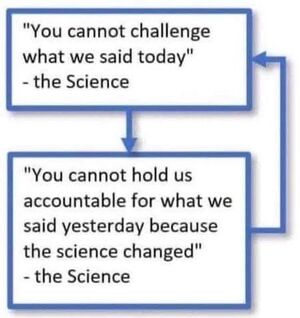Scientism
(Ideology, Science/Problematic notions) | |
|---|---|
 | |
| Interest of | Skeptical about skeptics |
| Subpage(s) | •Scientism/Invisible College |
| Science™ when used as a bullying technique: "just shut up and follow the experts". Exaggerated belief in science | |
Not to be confused with science
“Attacks on me are really also 'attacks on science'.”
Anthony Fauci (Jun 10, 2021) [1]
The term Scientism, or The Science(™), refers to the use of (pseudo-)scientific arguments to try to establish truth without answering questions. It attempts to close down debate and implies that the popularity of theories (especially among professional, credentialed experts) is an acceptable substitute for a shortfall of their ability to explain real world evidence or make accurate predictions.[2]
Adherents of an exaggerated belief in science tend to not realize the existence of rigged science or that science is influenced by the prejudices and notions of the era[3]. This can be expressed as a trait of the individual, or be built into a culture through the academic system.
Scientism tends to stress bombastic conclusions from established institutions over use of healthy skepticism and the scientific method.
“Yet, in holding scientific research and discovery in respect, as we should, we must also be alert to the equal and opposite danger that public policy could itself become the captive of a scientific-technological elite.”
Dwight Eisenhower (1961) [4]

My dear Kepler, I wish that we might laugh at the remarkable stupidity of the common herd. What do you have to say about the principal philosophers of this academy who are filled with the stubbornness of an asp and do not want to look at either the planets, the moon or the telescope, even though I have freely and deliberately offered them the opportunity a thousand times? Truly, just as the asp stops its ears, so do these philosophers shut their eyes to the light of truth.[5]
Contents
In COVID-19
"Following the science" Was used as a reason for government actions during COVID-19, during which the phrase was used as a bullying technique, i.e. "just shut up and obey", potentially leading to horrific results, as decisions rammed through with scientific justifications often turn out to be disastrous in hindsight.
Origins
- Full article: Scientism/Invisible College
[clarification needed]
- Full article: Scientism/Invisible College
Discrediting prominent scientists is "terrorism"
“Antiscience has emerged as a dominant and highly lethal force, and one that threatens global security, as much as do terrorism and nuclear proliferation. We must mount a counteroffensive and build new infrastructure to combat antiscience, just as we have for these other more widely recognized and established threats... Antiscience is the rejection of mainstream scientific views and methods or their replacement with unproven or deliberately misleading theories, often for nefarious and political gains. It targets prominent scientists and attempts to discredit them.”
Peter Hotez (March 29, 2021) [6]
The Illusion of Evidence Based Medicine
In an interview with Leemon McHenry (PhD) in the Journeyman Pictures series: Perspectives on the Pandemic, he relates his experience with medical journals and their conduct. He details ghostwritten studies, captured legislators, revolving-door regulatory agencies, pay-to-play agreements, and "key opinion leaders" who lend their academic credentials to corporations for a price.[7] His book was published in mid 2020.[8]
References
- ↑ https://youtu.be/Uv1G-qm8jrM
- ↑ https://off-guardian.org/2024/03/27/why-do-people-claim-they-own-the-science/
- ↑ https://www.intellectualtakeout.org/blog/science-versus-scientism/
- ↑ https://www.ourdocuments.gov/doc.php?flash=true&doc=90&page=transcript Eisenhower's farewell address
- ↑ https://web.archive.org/web/20110718004557/http://moro.imss.fi.it/lettura/LetturaWEB.DLL?MODO=PAGINA&VOLPAG=10-423
- ↑ https://www.scientificamerican.com/article/the-antiscience-movement-is-escalating-going-global-and-killing-thousands/
- ↑ Perspectives on the Pandemic | "The Illusion of Evidence Based Medicine" | Episode 13 Remastered
- ↑ https://www.amazon.de/Illusion-Evidence-Based-Medicine-English-ebook/dp/B08C4ZNNMH
An example
| Page name | Description |
|---|---|
| "Safe and effective" | A legal designation for drugs, but also a marketing term to foster acceptance. |
Related Quotations
| Page | Quote | Author | Date |
|---|---|---|---|
| Big pharma | “It is simply no longer possible to believe much of the clinical research that is published, or to rely on the judgment of trusted physicians or authoritative medical guidelines. I take no pleasure in this conclusion, which I reached slowly and reluctantly over my two decades as an editor of the New England Journal of Medicine.” | Marcia Angell | 2009 |
| Big pharma | “Much of the scientific literature, perhaps half, may simply be untrue. Afflicted by studies with small sample sizes, tiny effects, invalid exploratory analyses, and flagrant conflicts of interest, together with an obsession for pursuing fashionable trends of dubious importance, science has taken a turn towards darkness.” | Richard Horton | 2015 |
| Brian Martin | “Science is normally presented to the public as an enterprise based on skepticism and openness to new ideas, in which evidence and argumentation are examined on their own merits. Trusting newcomers who present views that conflict with standard ideas may thus expect that their work will be given a prompt, fair, and incisive analysis, being accepted if it passes scrutiny and being given detailed reasons if not. When, instead, their work is ignored, ridiculed, or rejected without explanation, they assume that there has been some sort of mistake, and often begin a search to find the "right person"; someone who fits the stereotype of the open-minded scientist. This can be a long search! Certain sorts of innovation are welcome in science, when they fall within established frameworks and do not threaten vested interests. But aside from this sort of routine innovation, science has many similarities to systems of dogma. Dissenters are not welcome. They are ignored, rejected, and sometimes attacked. To have their ideas examined fairly, it is wishful thinking to rely on the normal operation of the scientific reception system. To have a decent chance, dissenters need to develop a strategy. They need to understand the way science actually operates, to work out their goals, and then to formulate a plan to move towards those goals, taking into account likely obstacles and sources of support.” | Brian Martin | 1998 |
| Thabo Mbeki | “Not long ago, in our own country, people were killed, tortured, imprisoned and prohibited from being quoted in private and in public because the established authority believed that their views were dangerous and discredited. We are now being asked to do precisely the same thing that the racist apartheid tyranny we opposed did, because, it is said, there exists a scientific view that is supported by the majority, against which dissent is prohibited... People who otherwise would fight very hard to defend the critically important rights of freedom of thought and speech occupy, with regard to the HIV-AIDS issue, the frontline in the campaign of intellectual intimidation and terrorism...” | Thabo Mbeki | |
| Peer review | “The mistake, of course, is to have thought that peer review was any more than a crude means of discovering the acceptability — not the validity — of a new finding. Editors and scientists alike insist on the pivotal importance of peer review. We portray peer review to the public as a quasi-sacred process that helps to make science our most objective truth teller. But we know that the system of peer review is biased, unjust, unaccountable, incomplete, easily fixed, often insulting, usually ignorant, occasionally foolish, and frequently wrong.” | Richard Horton | |
| Murray Rothbard | “It has always been a bit of mystery to me why left-environmentalists, who shriek in horror at a bit of Alar on apples, who cry "cancer" even more absurdly than the boy cried "Wolf," who hate every chemical additive known to man, still cast their benign approval upon fluoride, a highly toxic and probably carcinogenic substance. And not only let fluoride emissions off the hook, but endorse uncritically the massive and continuing dumping of fluoride into the nation's water supply.” | Murray Rothbard | 1993 |
Related Document
| Title | Type | Publication date | Author(s) | Description |
|---|---|---|---|---|
| File:The Rape of the Mind by Joost A. M. Meerloo.pdf | book | Joost A. M. Meerloo |

